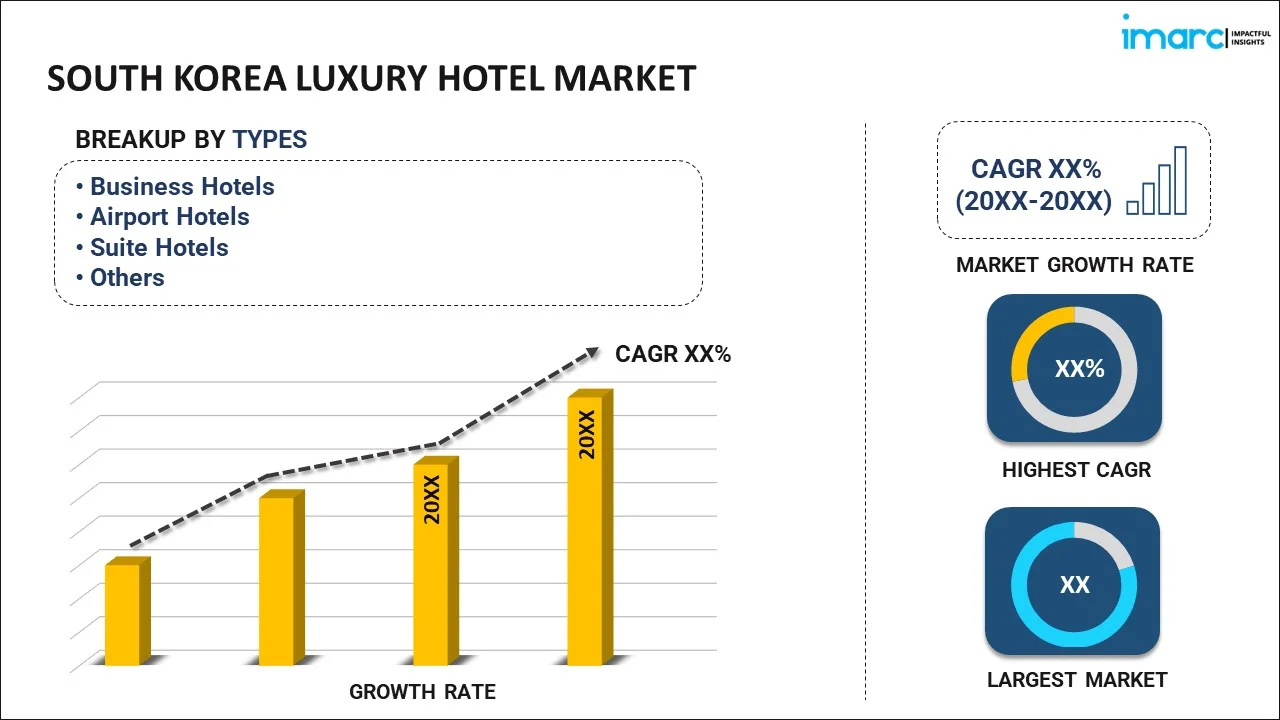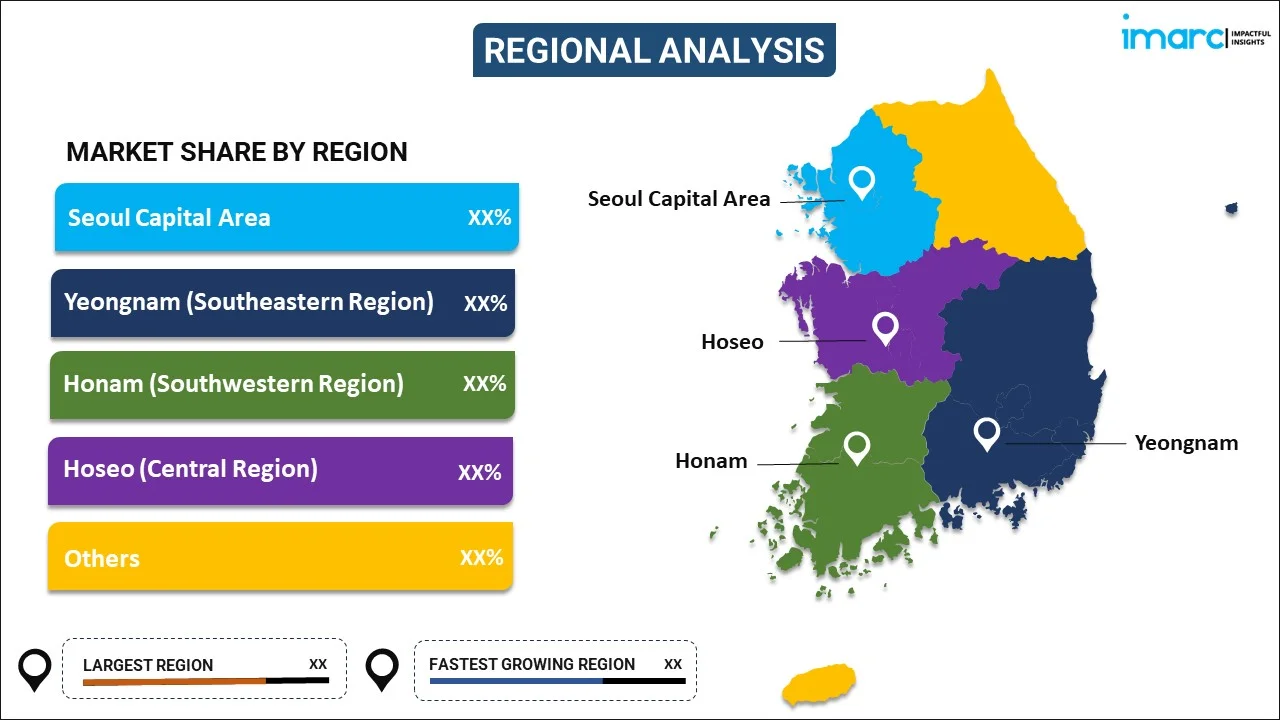
South Korea Luxury Hotel Market Report by Type (Business Hotels, Airport Hotels, Suite Hotels, Resorts, and Others), Room Type (Luxury, Upper-Upscale, Upscale), Category (Chain, Independent), and Region 2025-2033
Market Overview:
The South Korea luxury hotel market size reached USD 2.2 Billion in 2024. Looking forward, IMARC Group expects the market to reach USD 3.7 Billion by 2033, exhibiting a growth rate (CAGR) of 5.51% during 2025-2033. The significant expansion in the South Korea tourism industry, the emerging technological advancement to enhance the guest experience with automated check-in processes and in-room smart controls, and the development of new luxury hotel properties and the refurbishment of existing ones represent some of the key factors driving the market.
|
Report Attribute
|
Key Statistics
|
|---|---|
|
Base Year
|
2024
|
|
Forecast Years
|
2025-2033
|
|
Historical Years
|
2019-2024
|
|
Market Size in 2024
|
USD 2.2 Billion |
|
Market Forecast in 2033
|
USD 3.7 Billion |
| Market Growth Rate 2025-2033 | 5.51% |
A luxury hotel is a high-end accommodation establishment that offers an exceptional level of service, comfort, and amenities to its guests. These hotels are known for providing an unparalleled experience beyond the basics of a standard hotel stay. It is often characterized by its exquisite attention to detail, personalized services, and opulent features. The quality of its accommodations is excellent, offering guests spacious, beautifully decorated rooms or suites with luxurious furnishings, high-quality linens, and advanced technology. Many luxury hotels also offer breathtaking views of iconic landmarks or natural landscapes. Additionally, several luxury hotels offer services where guests are treated with the utmost care and respect from the moment they arrive. Highly trained staff members are available around the clock to cater to every need, such as making restaurant reservations, arranging transportation, or providing personalized recommendations for local attractions. Also, dining options at luxury hotels are often world-class, with several on-site restaurants offering numerous culinary experiences. Some luxury hotels offer Michelin-starred dining establishments where renowned chefs create exquisite dishes using the finest ingredients. Moreover, luxury hotels frequently feature extensive wellness and leisure facilities, including luxurious spas offering several treatments, fitness centers equipped with advanced equipment, and, often, beautiful swimming pools or rooftop lounges with stunning views.
South Korea Luxury Hotel Market Trends:
The market is primarily driven by the growing tourism industry. In addition, the increasing popularity of South Korea as a travel destination is influencing the market growth. The country's vibrant culture, rich history, and stunning natural landscapes have drawn visitors from around the world. As South Korea's global prominence increased, it escalated the demand for luxurious lodging options, such as luxury hotels that are capitalizing on this trend by offering exceptional amenities and services tailored to the needs of discerning travelers. Moreover, several innovations and technologies also contributed to the growth of its luxury hotel sector, as many luxury hotels are embracing advanced technologies to enhance the guest experience, from automated check-in processes to in-room smart controls, representing another major growth-inducing factor. Besides this, the South Korean government implemented policies aimed at promoting tourism and incentivizing investments in the hospitality sector, which encourage the development of new luxury hotel properties and the refurbishment of existing ones, elevating the overall standard of accommodations in the country, thus accelerating the market growth. Along with this, the country has positioned itself as a hub for international events and conferences with its modern infrastructure, advanced convention centers, and well-developed transportation networks, which made it an ideal location for hosting corporate gatherings and international summits, which is escalating the demand for upscale accommodations to cater to the needs of business travelers.
South Korea Luxury Hotel Market Segmentation:
IMARC Group provides an analysis of the key trends in each segment of the market, along with forecasts at the country level for 2025-2033. Our report has categorized the market based on type, room type, and category.
Type Insights:

- Business Hotels
- Airport Hotels
- Suite Hotels
- Resorts
- Others
The report has provided a detailed breakup and analysis of the market based on the type. This includes business hotels, airport hotels, suite hotels, resorts, and others.
Room Type Insights:
- Luxury
- Upper-Upscale
- Upscale
A detailed breakup and analysis of the market based on the room type have also been provided in the report. This includes luxury, upper-upscale, and upscale.
Category Insights:
- Chain
- Independent
The report has provided a detailed breakup and analysis of the market based on the category. This includes chain and independent.
Regional Insights:

- Seoul Capital Area
- Yeongnam (Southeastern Region)
- Honam (Southwestern Region)
- Hoseo (Central Region)
- Others
The report has also provided a comprehensive analysis of all the major regional markets, which include Seoul Capital Area, Yeongnam (Southeastern Region), Honam (Southwestern Region), Hoseo (Central Region) and Others.
Competitive Landscape:
The market research report has also provided a comprehensive analysis of the competitive landscape in the market. Competitive analysis such as market structure, key player positioning, top winning strategies, competitive dashboard, and company evaluation quadrant has been covered in the report. Also, detailed profiles of all major companies have been provided.
South Korea Luxury Hotel Market Report Coverage:
| Report Features | Details |
|---|---|
| Base Year of the Analysis | 2024 |
| Historical Period | 2019-2024 |
| Forecast Period | 2025-2033 |
| Units | Billion USD |
| Scope of the Report | Exploration of Historical and Forecast Trends, Industry Catalysts and Challenges, Segment-Wise Historical and Predictive Market Assessment:
|
| Types Covered | Business Hotels, Airport Hotels, Suite Hotels, Resorts, Others |
| Room Types Covered | Luxury, Upper-Upscale, Upscale |
| Categories Covered | Chain, Independent |
| Regions Covered | Seoul Capital Area, Yeongnam (Southeastern Region), Honam (Southwestern Region), Hoseo (Central Region), Others |
| Customization Scope | 10% Free Customization |
| Post-Sale Analyst Support | 10-12 Weeks |
| Delivery Format | PDF and Excel through Email (We can also provide the editable version of the report in PPT/Word format on special request) |
Key Questions Answered in This Report:
- How has the South Korea luxury hotel market performed so far and how will it perform in the coming years?
- What is the breakup of the South Korea luxury hotel market on the basis of type?
- What is the breakup of the South Korea luxury hotel market on the basis of room type?
- What is the breakup of the South Korea luxury hotel market on the basis of category?
- What are the various stages in the value chain of the South Korea luxury hotel market?
- What are the key driving factors and challenges in the South Korea luxury hotel?
- What is the structure of the South Korea luxury hotel market and who are the key players?
- What is the degree of competition in the South Korea luxury hotel market?
Key Benefits for Stakeholders:
- IMARC’s industry report offers a comprehensive quantitative analysis of various market segments, historical and current market trends, market forecasts, and dynamics of the South Korea luxury hotel market from 2019-2033.
- The research report provides the latest information on the market drivers, challenges, and opportunities in the South Korea luxury hotel market.
- Porter's five forces analysis assist stakeholders in assessing the impact of new entrants, competitive rivalry, supplier power, buyer power, and the threat of substitution. It helps stakeholders to analyze the level of competition within the South Korea luxury hotel industry and its attractiveness.
- Competitive landscape allows stakeholders to understand their competitive environment and provides an insight into the current positions of key players in the market.
Need more help?
- Speak to our experienced analysts for insights on the current market scenarios.
- Include additional segments and countries to customize the report as per your requirement.
- Gain an unparalleled competitive advantage in your domain by understanding how to utilize the report and positively impacting your operations and revenue.
- For further assistance, please connect with our analysts.
 Request Customization
Request Customization
 Speak to an Analyst
Speak to an Analyst
 Request Brochure
Request Brochure
 Inquire Before Buying
Inquire Before Buying




.webp)




.webp)












